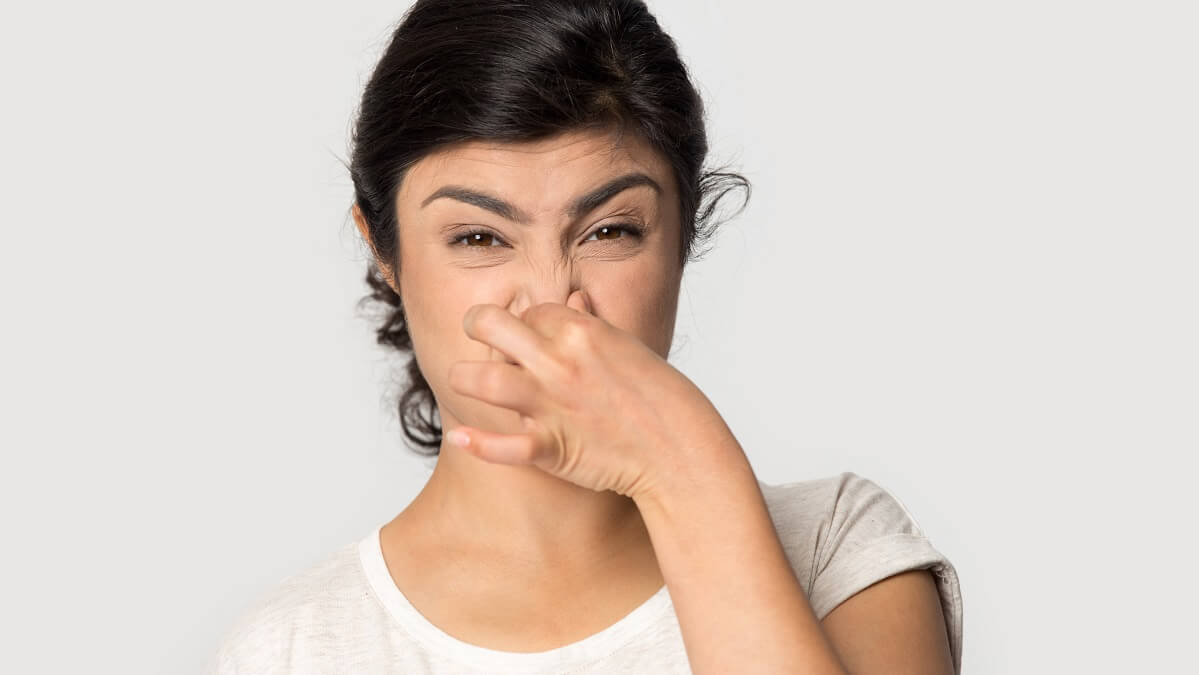When we think of body odour, we typically think ‘unpleasant’ and want to cover it as much as possible. Fortunately, deodorants, perfumes and mouthwash can cover everything from wearing jeans for a day too many to the garlic you had at lunch.
However, if you continually mask smells, you could be ignoring some serious health issues.
Changes in body odour can be due to innocent things such as excessive sweating, poor hygiene, medications or foods. But sudden and persistent changes to your normal odour can be a sign of an underlying condition.
Here are some bad smells you shouldn’t ignore.
Bad breath
Waking up with less than fresh breath is normal; saliva helps to get rid of odour-causing bacteria and we produce a lot less saliva when we sleep. Your breath might also smell when you’re hungry or dehydrated, or after you’ve eaten foods containing garlic and onions. That’s all quite normal.
However, changes in your breath can be a symptom of several health conditions including sinus infections, gum disease and acid reflux.
Sjogren’s syndrome is an autoimmune disease that attacks the glands that make tears and saliva and can leave the sufferer with a dry mouth and halitosis.
If you notice your breath smelling fruity, it could be a symptom of diabetes.
Belly button
There could be as many as 70 different types of bacteria living in your navel.
If you’ve forgotten to get in there with the soap in the shower for a few days, your belly button can get a little funky. If the odour isn’t washed away with some scrubbing and a little water though, it could be a sign of infection.
If you have diabetes, it’s easier to get infections and a small cut or scrape in your belly button could become infected.
Ears
Earwax is normal and an important part of keeping ears healthy and clean. However, odorous earwax can indicate a problem such as an ear infection, swimmer’s ear, ear cancer or a foreign object stuck in the ear.
If you notice a change in your earwax consistency or smell, look out for discharge or blood and see your GP if symptoms persist.
Urine
Urine consists mainly of water. It’s the amount and concentration of various waste products excreted by the kidneys that cause it to smell.
Some foods, such as asparagus, and certain medications can cause a noticeable urine odour, even in low concentrations.
An unusual smell can be caused by more serious health conditions such as cystitis, diabetic ketoacidosis or urinary tract infections.
Odorous stools
Faeces that smell extra bad could be a sign of lactose intolerance.
If you notice your gas or bowel movements are smellier after eating or drinking dairy, you may want to check in with your doctor and make adjustments to your diet.
If the bad smell is accompanied by belly cramps, diarrhoea or nausea, it could be an infection.
Feet
Foot odour is a common problem as each foot has 250,000 sweat glands and can produce up to 500ml of sweat daily.
Washing your feet with antibacterial soap and drying them fully can help. You can also use an antiperspirant or apply methylated spirits once or twice a day to try to dry the skin, especially between the toes.
It’s also important to give your shoes a chance to dry out. Spraying them with a disinfectant will kill the bacteria that cause odour.
If you do all this regularly and can’t shake the stench, you may have a fungal infection. Watch for dry, scaly skin around your toes, redness and blisters, which may be signs of athlete’s foot. Untreated athlete’s foot can lead to bacterial infections such as cellulitis.
Groin
Depending on your sex, groin smells can be caused by a variety of things.
In men, balanitis is a condition that usually affects uncircumcised men, causing an infection and irritation in the foreskin.
Non-gonococcal urethritis is an inflammation of the urethra, which can be caused by chlamydia infections as well as injuries to the urethra. The extra presence of bacteria can cause an unpleasant smell.
In women, bacterial vaginosis can occur due to an overgrowth of bacteria and can be accompanied by a fishy smell. Cervical or vaginal cancer can also cause unusual odours in the later stages.
Excessive sweating
We all sweat but some people can sweat uncontrollably. The main function of sweat is to cool us down when our body temperature is too high. When the water in your sweat evaporates, it cools down the surface of your skin.
You might also sweat when you eat hot or spicy food, have a fever, or experience emotional distress.
But if you sweat excessively, it could be caused by an underlying medical condition, such as obesity, infections, diabetes or thyroid problems.
Some medications may also cause you to sweat a lot. These can include medications used to treat depression such as selective serotonin reuptake inhibitors (SSRI’s) and tricyclic antidepressants.
You should seek medical treatment if:
- you have any change in odour accompanied by signs of infection
- the smell could be related to toxin poisoning
- you have been diagnosed with cancer
- your diabetes is poorly managed, or you believe you may be experiencing diabetic ketoacidosis
- the bad odour is accompanied by pain, bleeding, or other serious symptoms
- the odour doesn’t go away.
Do you use deodorant or antiperspirant daily? Have you ever had to talk to someone about their body odour? Share your thoughts in the comments section below.
Also read: Scientists find more than 54,000 viruses in people’s poo
Disclaimer: This article contains general information about health issues and is not advice. For health advice, consult your medical practitioner.

